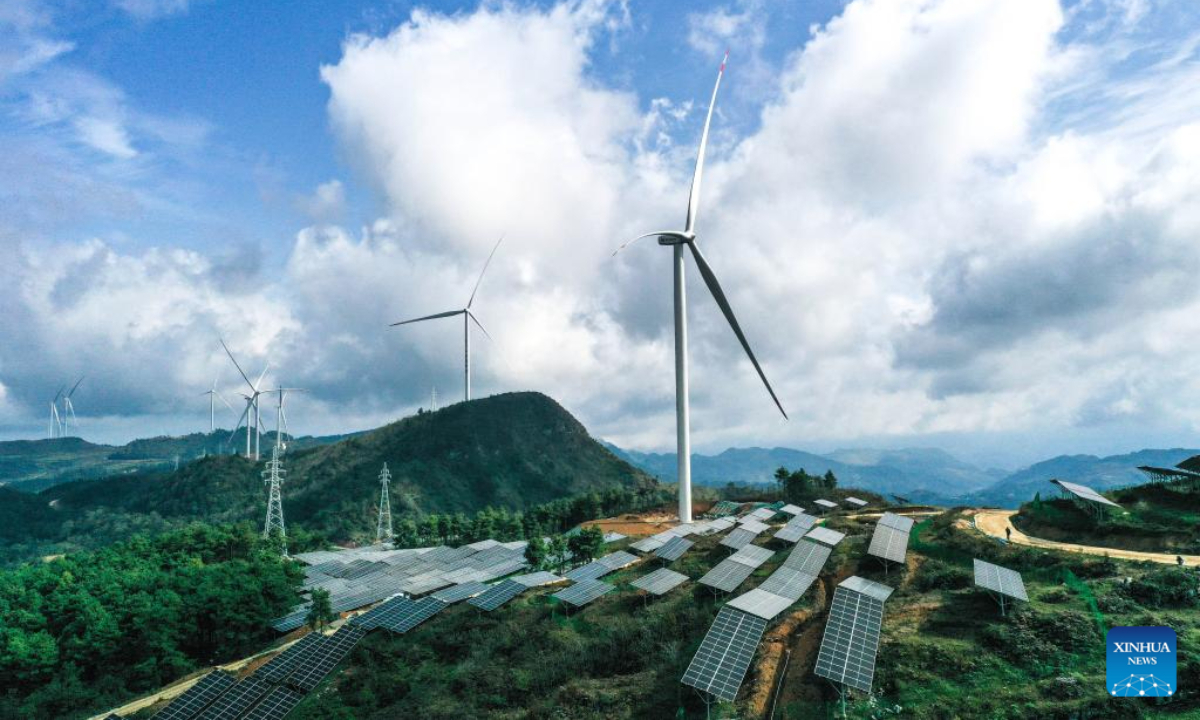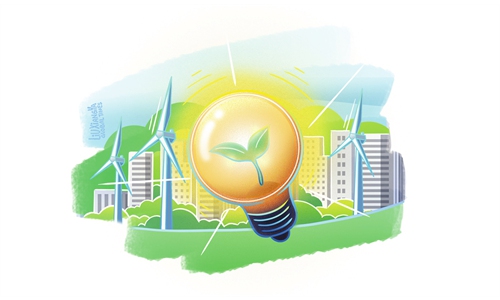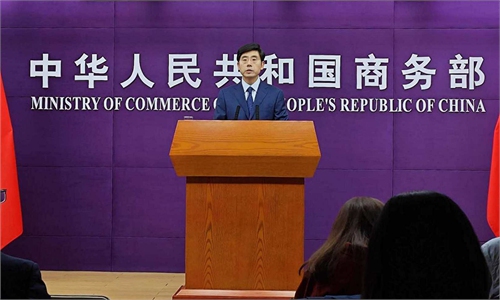IN-DEPTH / IN-DEPTH
China is actively addressing challenges brought by climate change amid complex international environment: Chinese new climate envoy Liu Zhenmin

This aerial photo taken on Nov 16, 2023 shows the Dingdongpo wind power-photovoltaic project in Shiqian County of Tongren City, southwest China's Guizhou Province. Photo:Xinhua
China is actively addressing the challenges brought by climate change, promoting green and low-carbon development, and playing a positive role in global climate governance, said Liu Zhenmin, China's special envoy for climate change.
Liu delivered the important speech at a high-level academic exchange meeting held by the China Institute for Reform and Development in Haikou, South China's Hainan Province, on March 31. The meeting attracted over 250 representatives from government, academia, business, and trade associations.
In his thematic report, Liu profoundly elaborated on China's key role and challenges in global climate governance. He emphasized that despite the changing international situation, China remains steadfast in advancing green and low-carbon development, actively fulfilling its international obligations, and seizing the opportunity of energy transition to contribute to sustainable development and the long-term interests of the country.
At the event, Liu shared with the Global Times that the purpose of the exchanges between China and EU is to enhance the sharing of relevant experience in confronting climate change. He also shared hopes for the success of the upcoming COP29 in Baku, Azerbaijan, at the end of the year. He told the Global Times that "as a friendly and developing country, China aims to ensure the success of this conference."
In January, as was decided by the Chinese government, Liu, former Vice Foreign Minister and former Under-Secretary-General of the UN, was appointed as China's special envoy for climate change, succeeding Xie Zhenhua.
Liu is a senior diplomat and took part in multilateral negotiations on climate change as the head and major member of the Chinese delegation multiple times and, while serving as Under-Secretary-General for the United Nations Department of Economic and Social Affairs, presided over the work in areas of climate change and sustainable development, said a Chinese foreign ministry spokesperson on January 15 at a press conference.
A crucial time for China and the world
The year of 2023 was the hottest year on record. The World Meteorological Organization reported unprecedented global temperature records, revealing an alarming new annual average of 1.45 C above pre-industrial levels, based on six leading international datasets. This surpasses the critical 1.5 C threshold outlined in the 2015 Paris Agreement.
During his speech, Liu pointed out that humanity has entered a new era characterized by decarbonization, with energy transition as a core issue. He emphasized that this transition involves not only a transformation of energy itself but also a profound change in human production and lifestyles. Countries need to promote energy structure transformation and achieve net-zero emissions while ensuring energy security and promoting economic and social development.
"The global energy system must start transitioning away from fossil fuels in a manner that is fair, orderly, and equitable, to achieve net-zero emissions by 2050," Liu said.
Liu mentioned that since the Paris Agreement, countries worldwide have been defining their timelines for peaking carbon emissions and achieving carbon neutrality. Currently, over 150 countries have set goals for peaking emissions and achieving carbon neutrality, covering 92 percent of the global land area, 85 percent of the population, and 88 percent of total greenhouse gas emissions. Most countries aim to achieve carbon neutrality by 2050 or later, but 12 countries, mostly smaller ones, have committed to achieving it before 2050.
China aims to peak its carbon emissions by 2030 and strives to achieve carbon neutrality before 2060. To achieve the goal, China has been closely following the global climate change response by actively implementing various international legal agreements and regulations, showing its determination and actions in advancing energy transition and tackling climate change.
According to Bloomberg's Energy Transition Investment Trends 2024 report on energy transition investment trends, which highlighted a 17 percent increase in global energy transition investments in 2023, reaching a historic high of $1.8 trillion. The report also outlined key areas reflecting the focus and progress of different countries in new energy development.
Liu noted China's significant investment and development in these key areas, particularly in transportation electrification. For example, China's leading position in photovoltaic and wind power sectors is driving the transformation of the global energy structure and reducing related technology costs, as well as significantly impacting the global energy transition process.
However, China also faces pressures and challenges on its path toward achieving its dual-carbon goals, reflecting both domestic transformation needs and international expectations and pressures.
"As a developing country, we are still in the process of achieving industrialization and modernization. Our economy will continue to grow in the future, and in terms of total energy supply, we need to meet the growing demands of our economic and social development as well as the increasing needs of our people's livelihoods," Liu said.
He pointed out the increasing demand for electricity with the development of technologies like artificial intelligence and big data, necessitating a secure power supply. Therefore, he mentioned, China has increased coal production and built new power plants to replace old coal-fired ones, ensuring electricity supply.
He added that while renewable energy will play a significant role in the future energy mix, it also introduces vulnerabilities due to the variability and uncertainty of sources like solar and wind energy. He cited instances where renewable energy might not meet electricity demand due to unfavorable weather conditions.
The establishment of the carbon market in China is also noteworthy. In his speech, Liu noted that the carbon trading market should not be fully market-driven like the stock market, which primarily facilitates investment and profit-making among investors. He stressed that the carbon market should operate under strict national regulation and control, ensuring that enterprises participate under state authorization to meet national emission reduction targets.
According to the Ministry of Ecology and Environment, the national carbon emission trading market has completed two compliance cycles, covering an annual CO2 emission of about 5.1 billion tons and includes 2,257 key emitting units. It has become the world's largest carbon market in terms of greenhouse gas emissions covered and has achieved its construction goals. In early February, the State Council issued the "Interim Regulations on Carbon Emission Trading Management," which became the latest fundamental law governing China's carbon market.
Liu pointed out the necessity of nationwide participation in changing traditional production and lifestyle patterns. He emphasized focusing on strengthening regulation and implementing economic policies to align economic activities with environmental protection goals.
Liu connected this development strategy with two crucial timelines for China: Realizing socialist modernization by 2035 and realizing national rejuvenation. "Our carbon energy transition and green, low-carbon development must ensure the achievement of energy transition goals, while also supporting the Chinese path to modernization and the great rejuvenation of the Chinese nation.
Enlarging cooperation amid complex international situation
In the face of the increasingly severe global climate change issues, addressing climate change has become a significant agenda in global governance. Against the backdrop of profound and complex changes in the current international and domestic situation, strengthening international cooperation and promoting the transformation and green, low-carbon development of global climate governance have become common goals for all countries.
Climate envoys from the Netherlands, Denmark, France, Germany, and the European Union visited China from April 10-12, according to the Dutch Embassy in China's public WeChat public account. During their visit, they engaged in in-depth discussions with China's special envoy Liu, and Zhao Yingmin, Vice Minister at the Ministry of Ecology and Environment.
The discussions covered various topics including energy efficiency, nuclear power, and the role of hydrogen in achieving national climate goals. Additionally, the envoys learned about the impacts of climate change on China and visited the State Grid Corporation of China to discuss challenges and solutions related to integrating renewable energy into the power grid.
The report highlighted that this visit marked a crucial step in China-Europe climate diplomacy and laid the groundwork for successful future cooperation. Constructive and regular dialogue between the EU and China is deemed essential for the enhancing of mutual understanding.
While talking about the visit, Liu told the Global Times at the March event that "our exchanges aim to strengthen the sharing of experiences in responding to climate change. The dialogue between China, Europe, and the US mainly focuses on how to effectively maintain measures against climate change and the multilateral process of global climate change."
Liu told the Global Times that "our exchanges aim to strengthen the sharing of experiences in responding to climate change. The dialogue between China, Europe, and the US mainly focuses on how to effectively maintain measures against climate change and the multilateral process of global climate change."
He highlighted the importance of these interactions, especially given the attention on the direction the US will take after Election Day in November. Since China and the EU have bilateral cooperation agreements that have been in place since 2016, "we are very concerned about the development of these forms of cooperation," he told the Global Times.
During the speech, Liu also reviewed the last 30 years of global climate change negotiations, particularly highlighting the impact of US political changes on climate policy.
He noted that US climate policies significantly differ under Republican and Democratic administrations: Republican administrations tend to withdraw from climate agreements, such as the Bush administration's withdrawal from the Kyoto Protocol and the Trump administration's exit from the Paris Agreement, while Democratic administrations are more proactive about climate change.
Liu pointed out that although a consensus on climate change is gradually forming within the US and support is growing, US political uncertainty still poses a challenge to global climate governance, and EU and other Western countries are deeply concerned about the possibility of the US withdrawing from international climate agreements again and are seeking strategies to address this uncertainty.
Expectations for COP29 and future
The COP29, the 29th meeting of the Conference of the Parties to the United Nations Framework Convention on Climate Change, is set to be held at the end of the year in Baku, Azerbaijan, with all parties prepared.
Liu told the Global Times that the incoming chair from Azerbaijan has visited, and leaders from China's various departments have met with him. He said that as a friendly and developing nation, China aims to ensure the success of the conference. Azerbaijan, as an energy exporter and oil-producing country, hopes to successfully host the conference, ensuring its sustainability for years to come.
While on his visit to China, the Assistant of the President of Azerbaijan for Foreign Policy Affairs Hikmat Hajiyev told the Global Times in an exclusive interview that the country seeks to build understanding and solidarity between the "Global North" and "Global South," and he praised China as a champion for green technology.
"In our green transition agenda, we see China as a partner for us. We are also asking our Chinese friends to establish production lines for renewable energies in Azerbaijan," Hajiyev said.
COP28 in Dubai in December 2023 mobilized over $85 billion in funding, launching and supporting 11 pledges and declarations on transforming food systems, health, renewables, energy efficiency, and decarbonizing heavy-emitting industries. Parties also agreed on targets for the Global Goal on Adaptation (GGA) and its framework, outlining necessary resilience measures against climate change. This framework signifies a global consensus on adaptation goals and the need for financial, technological, and capacity-building support to achieve them.
Liu noted China's role in global governance, particularly in leading breakthroughs in climate governance among developing countries or nations of the Global South.
Despite the feeling of insufficient voices for developing countries in past climate conferences, China is striving to change this situation by proposing measures like the Global Security Initiative, highlighting non-traditional security issues, including climate governance, he said.





